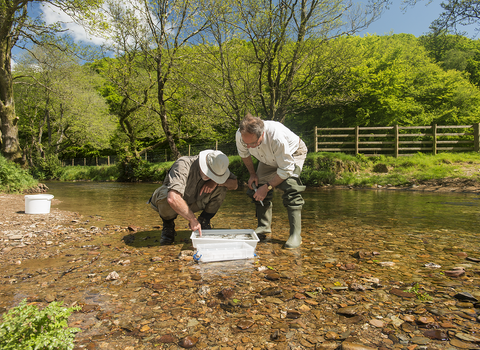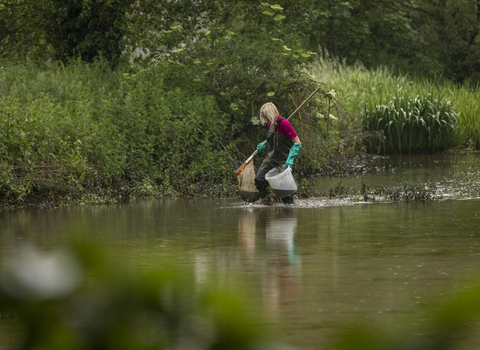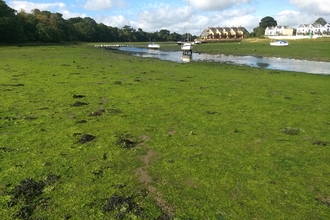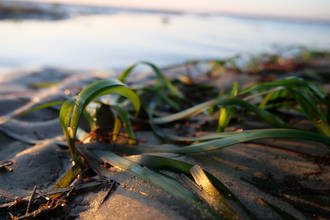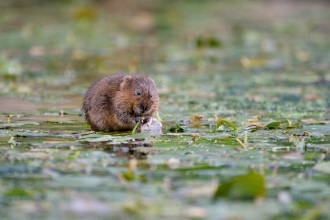Water pollution
Rivers are struggling under the effects of pollution with just 14% meeting good environmental standards and none reaching good chemical status. Sewage and urban pollution, agricultural pollution, and industrial pollution all contribute to the problem.
A legacy of pollution
Today, farming and wastewater (both treated and untreated) are the current main drivers of river pollution in England. And these sectors pose a real challenge for our rivers - too many nutrients. Nitrate and phosphate in rivers and lakes disrupt the natural ecology and suffocate algal blooms in our rivers and on our shores. This disrupts the finely balanced food webs, sending shockwaves up and down the chain impacting invertebrates, plants and animals, and in turn the entire ecosystem. In these oxygen-starved and polluted conditions, many freshwater species that are sensitive to high concentrations of phosphorus are ultimately unable to survive. It's a huge challenge to river health and one that is exacerbated by climate extremes and higher temperatures.
To add to this, we are also dealing with legacy pollution: persistent hazardous chemicals from times gone by which are still present in freshwater. Plus, farmers are generally using fewer chemical inputs now than they did thirty years ago. But, as it takes decades for phosphates to filter through the chalk aquifers and into our rivers, even if we stopped all fertiliser runoff tomorrow, we would still see the accumulation of impacts for decades to come.
Sewage pollution
While wastewater treatment facilities can filter out a high proportion of nitrates and phosphates to prevent them from escaping into our rivers, the UK’s Victorian sewerage system is woefully inadequate leading to water companies routinely dumping raw sewage through ‘Combined Sewer Overflows’ (CSOs) even when there is no rainfall.
Water companies have failed to invest to protect the coastal and river environment, including on our precious chalk streams. Their over-reliance on CSOs, which should only be used for extreme rainfall, has led to an outrageous 4,879 sewage spills flowing for 38,525 hours across Hampshire and the Isle of Wight in 2022 alone.
Sewage pollution isn’t just disgusting, it is a threat to wildlife, puts us all at risk and costs a lot to put right. It is now estimated to be responsible for up to 36% of rivers failing to meet good ecological status.
Agricultural pollution
Agriculture covers approximately 70% of Hampshire and the Isle of Wight land and is responsible for over 40% of our rivers failing to achieve good ecological status and at least 35% of the phosphorus that ends up in them.
Diffuse pollution from agriculture seriously harms wildlife. This is the process by which excess sediments, nutrients and chemicals from agricultural practice seep into our rivers. This can be problematic as it is difficult to trace and attribute which farm the pollution has come from. While most agricultural pollution incidents are minor, when there are thousands of them, they add up to major consequences for our rivers.
2.9 million tonnes of soil are lost from fields every year in England and Wales, in a process called ‘surface run-off’. Excess fine sediment from this soil loss clogs up our rivers, destroying habitats in the process.
Chemical Pollution
It’s not just the untreated sewage in our rivers that harms us and wildlife. There’s a toxic cocktail of chemicals brewing in our streams from pharmaceuticals to illegal drugs, personal care products and industrial chemicals.
These have the potential to cause catastrophic, but currently unknown impacts, to people and the wildlife in our rivers and seas. Research has revealed that even in tiny quantities many pharmaceuticals can affect wildlife, such as crustaceans and molluscs, changing the creature’s behaviour and internal makeup, including their growth and reproduction.
What action is needed to clean up our rivers?
Cleaning up rivers won’t be easy. Their current state is the result of decades of under-investment and cumulative pollution, with many still suffering the consequences of our industrial past. But this does not mean we lose hope. It means we act now to save rivers for future generations: by cleaning up the inherited problems, tackling nutrients from multiple sources, and taking decisive action to prevent emerging pollutants, like pharmaceutical waste and microplastics, from leaving another damaging legacy for our children.
Action needed by our Government
-
Bespoke legal protections for all our chalk streams that protect them from over-abstraction and pollution and drives investment by water companies into these special ecosystems.
-
Double the nature-friendly farming budget (the Environmental land Management Schemes) to support farmers to reduce their impacts on rivers and restore vital habitats.
-
Environmental regulators need the resources and funding to enforce current legislation and hold polluters to account.
-
Polluters must pay penalties that reflect the true environmental damage being caused.
-
Independent, continuous monitoring of sewage discharge should be mandatory. Water companies should not be marking their own homework!
-
Take chemical pollution seriously and look to work to prevent chemicals with unknown consequences entering our rivers.
-
Bring forward targets to put our rivers in good ecological condition
Action needed by water companies
-
Invest in the necessary sewage infrastructure to end the routine use of Combined Sewage Overflows and keep pace with population growth and climate change. This should not be at the expense of the customer.
-
Nature should come first – rapidly scale and prioritise nature-based solutions, especially in chalk stream catchments, restoring natural features such as wetlands and woodlands which act as a natural filter for pollutants.
-
Take chemical pollution seriously and upgrade wastewater treatment plants to prevent chemicals with unknown consequences from entering our rivers.
Action needed from councils
-
We need to see councils deliver an Action Plan for rivers to drive coordinated efforts across catchments to restore our rivers and drive investment to where it's needed the most.
-
Incentivise and create green infrastructure in towns and cities, to slow the flow of surface run-off and reduce the risk of sewer systems overflowing
-
Councils can support our rivers by putting in place strong policies in the Local Plans to protect our rivers, for example by embedding the recommendations of the Chalk Stream Strategy and ensuring there is water infrastructure in place before development begins.
-
Council can also monitor the health of our rivers and use this information to place pressure on water companies to stop damaging practices.
-
Support communities to take part in river protection and restoration initiatives by organizing citizen science opportunities, workshops, public meetings, and awareness campaigns.

